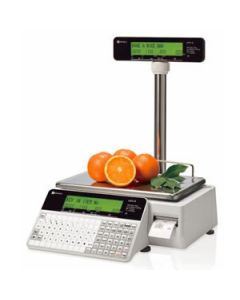In today’s fast-paced and highly regulated business environment, accuracy and compliance are main concerns for companies across various industries. One area where these concerns converge is in the realm of label printing scales. These devices play a crucial role in ensuring that products are accurately weighed, labeled, and compliant with regulatory requirements.
Understanding Label Printing Scales
Label printing scales are precision instruments that combine the functionality of weighing scales with label printing capabilities. They are commonly used in retail, manufacturing, and food service industries to weigh products accurately and print labels with essential information such as weight, price, barcodes, and product details. These scales are designed to streamline the labeling process, improve efficiency, and ensure compliance with industry standards and regulations.
Regulatory Framework
The regulatory landscape governing label printing scales is multifaceted and varies depending on the industry and geographical location. However, several key regulations and standards apply universally to ensure accuracy, fairness, and consumer protection:
Weights and Measures Regulations: These regulations set standards for the accuracy and precision of weighing instruments, including label printing scales. They often require regular calibration and certification to ensure consistent and reliable measurements.
Food Labeling Requirements: In the food industry, label printing scales must comply with regulations regarding the labeling of prepackaged foods, including accurate weight information, ingredient lists, nutritional facts, allergen declarations, and country of origin labeling.
Price Accuracy Regulations: Retail businesses must adhere to regulations that govern the accuracy of price labeling on products. Label printing scales play a crucial role in ensuring that the correct prices are displayed on labels, reducing errors and potential disputes with customers.
Barcode Standards: Barcode labeling standards ensure that products can be accurately scanned and tracked throughout the supply chain. Label printing scales must generate barcodes that meet these standards for efficient inventory management and traceability.
Legal Metrology Requirements: Legal metrology standards regulate the use of weighing and measuring instruments to protect consumers and promote fair trade practices. Label printing scales must comply with these standards to maintain legal compliance and avoid penalties.
Benefits of Compliance
Ensuring compliance with regulatory requirements regarding label printing scales offers several tangible benefits for businesses:
Avoidance of Penalties: Non-compliance with regulatory standards can result in hefty fines, legal consequences, and damage to a company’s reputation. By adhering to regulations, businesses mitigate the risk of penalties and maintain a positive image in the market.
Consumer Trust and Satisfaction: Accurate labeling instils confidence in consumers regarding the quality, quantity, and pricing of products. This builds trust and fosters long-term relationships with customers, leading to higher satisfaction levels and repeat business.
Operational Efficiency: Compliance with labeling regulations streamlines operational processes by reducing errors, rework, and customer complaints. Label printing scales that meet regulatory standards enhance efficiency and productivity in labeling and packaging operations.
Market Access and Expansion: Compliance with international standards and regulations enables businesses to access global markets and expand their customer base. Many countries have specific labeling requirements that must be met for products to be sold legally within their borders.
Maximizing Accuracy
Achieving maximum accuracy with label scales requires a proactive approach and adherence to best practices:
Calibration and Maintenance: Regular calibration and maintenance of label printing scales are essential to ensure accuracy and consistency in weight measurements. Calibration should be performed by trained technicians using certified weights.
Quality Control Checks: Implementing robust quality control processes, including regular checks of scale accuracy and label printing quality, helps identify and rectify issues before they impact product quality or compliance.
Staff Training: Proper training of personnel who operate label printing scales is crucial. Employees should understand how to use the equipment correctly, interpret measurement data, and recognize signs of malfunction or calibration drift.
Software Updates and Integration: Keeping scale software up to date with the latest firmware and integrating scales with enterprise systems (e.g., inventory management, POS) enhances accuracy, data integrity, and regulatory compliance.
Also Read: Benefits of Label Printing Scales
Conclusion
Label printing scales play a vital role in ensuring accuracy, compliance, and efficiency in various industries. Businesses must navigate a complex regulatory landscape to meet standards related to weights and measures, food labelling, price accuracy, barcoding, and legal metrology. By prioritizing compliance, companies can mitigate risks, build consumer trust, improve operational performance, and access new markets. Maximizing accuracy requires a comprehensive approach encompassing calibration, quality control, staff training, and technological integration.

